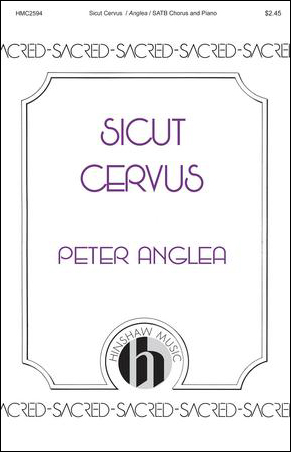
Sicut Cervus
SATB divisi with piano accompaniment; from Three Latin Psalms

SATB divisi with piano accompaniment; from Three Latin Psalms
Part of Three Latin Psalms, this piece is a companion to my more well-known “Jubilate Deo.” The text is based on Psalm 42.
“This Latin motet text taken from portions of Psalm 42 is known greatly through the unaccompanied setting by Palestrina. Here Peter Anglea sets the descriptive text for mixed voices and piano.”
Hinshaw Music
“As the hart panteth after the water brooks, so panteth my soul after thee, O God. My tears have been my meat day and night…Why art thou cast down, O my soul? And why art thou disquieted in me? Hope thou in God: for I shall yet praise him for the help of his countenance” (Psalm 42:1, 3, 5).
In this piece I attempted to paint the sorrow and pain that is felt when God seems far off. The poetry of the Psalms is full of imitation and repetition to express or emphasize certain ideas. The opening melodic line in the sopranos (“As the hart panteth…”) is repeated (“so panteth my soul”) to emphasize the similarity expressed in the text. The heaviness of spirit expressed in the middle portion of the piece is immediately followed up by an exultant phrase in the relative major to depict the hope the believer has in God despite troublesome circumstances in life. The end of the piece is an inversion of the beginning with the basses singing the initial melody with the sopranos, altos, and tenors harmonizing above them with “Oo’s” and “Ahh’s.”
These two are part of the larger set, “Three Latin Psalms,” that Jubilate Deo comes from.